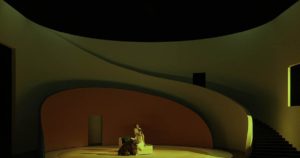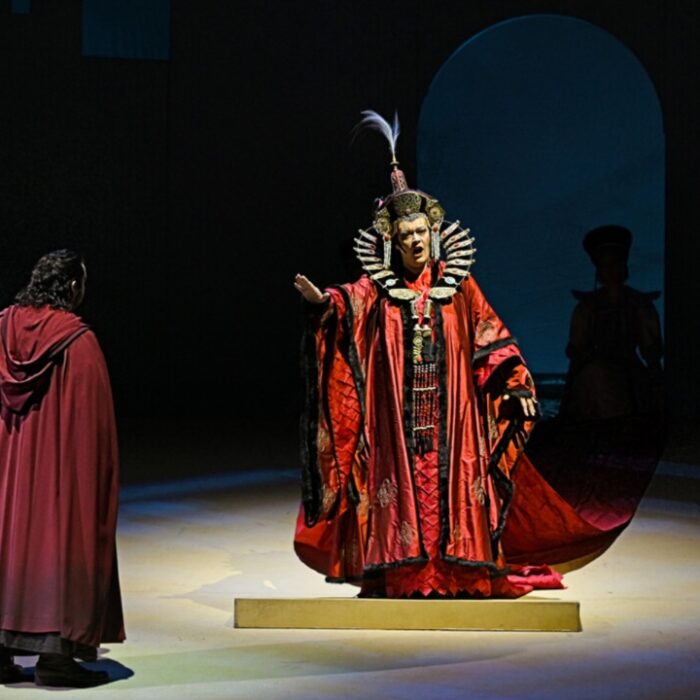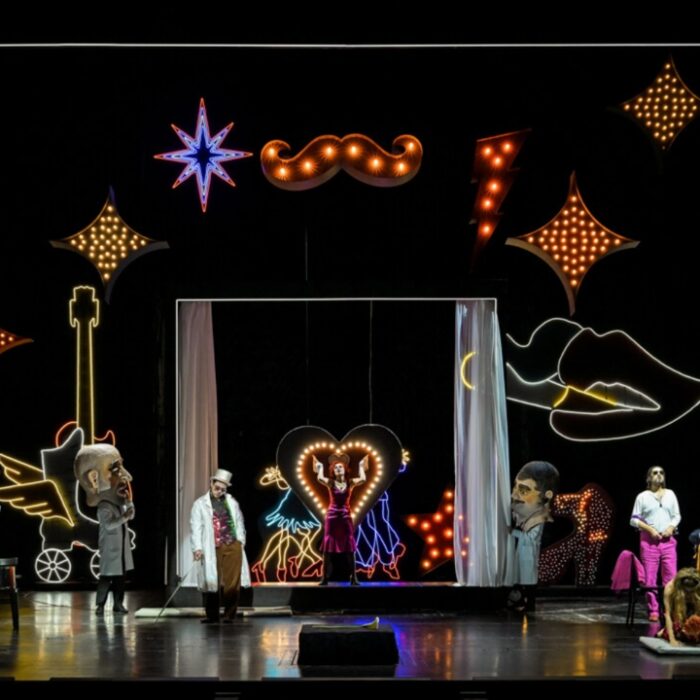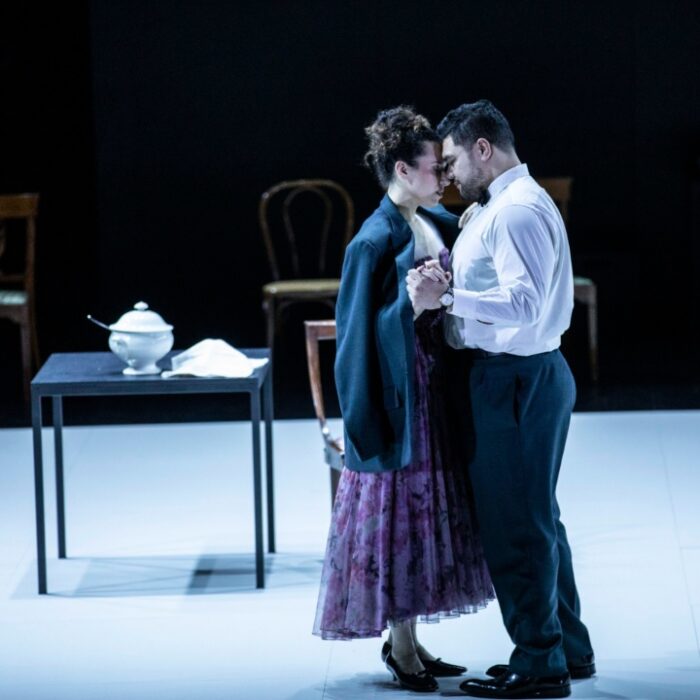
Theater Basel 2022-23 Review: Rigoletto
Vincent Huguet Exemplifies What Modern Opera Can & Should Be
By Mauricio VillaOn the 21st of January 2023, the Basel Opera premiered a new production of Verdi’s “Rigoletto,” directed by the French stage director Vincent Huguet. The result was an abstract, new production with a strong cast and a great conductor, a successful result all around that was recognized by the audience.
A Promising Star
Vincent Huguet is one of the most promising directors of this generation, having staged productions for the Staatsoper in Berlin and Paris Opera. He presented an abstract production with a minimalistic set which consisted of a big round wall with a staircase and several concentric round walls that turned and formed different spaces. Other that, he featured a table, some chairs, and a sofa. With this he managed to focus on the drama of the characters, creating believable and moving scenes like Gilda and Rigoletto’s duets in Act one and two; Rigoletto singing his aria “Cortigiani, vil razza dannata” encaged in a circular LED fence; or the final scene with Gilda expiring motionless on the table of Sparafucile’s tavern.
He drew deeply-layered characters creating a dark and hurting Rigoletto, a strong Gilda (rather than the naïve young girl who is usually presented) or even a human and sympathetic duke (the duke is usually played as a nonsense, womanizing fool). He managed to create incredible theatrical effects with his sense of rhythm and humor, like women, Marullo, and the Duke practicing Yoga during the Duke’s aria “Parmi verder le lagrime,” or having Rigoletto and Gilda seated at the same table with the Duke and Maddalena during “La donna è mobile” or “Bella figlia dell’amore.” Monterone enters a second time carrying the body of her daughter in her arms, creating an incredible shocking and dramatic scene while also setting us up for the fatal end to come.
But what was most fascinating here was that he achieved all of this nuance and narrative shifts without ever having to be disrespectful to the libretto or the music. He proved that you can stage an abstract production with a modern point of view without having to lose the plot or creating a parallel dramaturgy. The sets design by Pierre Yovanovitch and lightened by Cornelius Hunziker had a deep emotional impact, like a never-ending spiral of degradation and misery.
Full-Fledged Characterizations
From his opening line “in testa ache avete,” baritone Nikoloz Lagvilava emphasized that his Rigoletto would be a solid interpretation. His voice is dark, powerful, and with a warm timbre. He could easily color his voice to ridicule Monterone in Act one, or while imitating the duke in his first act aria “Parisiamo,” before sounding frightened in “Quel vecchio maledivami.” He was menacing and angry against the courtesans at a later moment. Oddly enough he opted to end his first aria as originally written way, rather than the traditional interpolated high G; that said, throughout the night he proved that he had no problem with high notes at all.
He sang beautifully long legato lines in his duet with Gilda, showing his breath control and technique. He portrayed a powerful character arc, going from ironic to angry to frustrated to remorseful, insulting, repenting, and ultimately destroyed. His interpretation of his famous aria “Cortigiani” was hair-raising, full of fury and rage, with strong high Gs before transforming into a lament as he begged with mezza voces and diminuendos for his daughter’s safety. His “Vendetta” was terrifying and he emitted two strong A flats at the end of Acts two and three. Rigoletto is not a hunchback in this production, but Lagvilava managed to portray an incredible sense of disability and darkness in his interpretation.
The tenor Pavel Valuzhin played a sympathetic duke. He posseses a lyrical voice with a clear timbre and good projection. He made his opening aria “Questa o quella” sound joyful and easy despite the challenging nature of tessitura; the tempi were quite fast but he managed to coronate the aria with a ringing B flat.
He then proved that he could sing beautiful legato lines in a high tessitura during his duet with Gilda in Act one, and ascended effortlessly, and in one breath, to the B flats on the difficult line “d’invidia agli uomini,” emitting a secure top high D flat at the end of the scene on “Addio!”
His interpretation of his second act aria “Ella mi fu rapita…parmi veder le lagrime” was sung with delicacy, beautiful mezza voce, and decrescendos, and navigated the passagio quite well after having done a couple of pushups, handstands, and other major physical challenges demanded by the staging. His cabaletta “Possente amor mi chiama” was strong and energetic. He sang a playful “La donna è mobile” in Act three although he did not sang the traditional cadenza ending in a top B natural, instead singing the written low B (He had no problem with high notes, so I doubt this was the singer’s choice). He easily managed the high tessitura of the quartet “Bella figlia dell’amore,” delivering several ringing B flats.,
Soprano Regula Mühlemann sang the heroine Gilda. She has a sweet crystalline timbre and good projection and her voice was closer to lyrical than leggera. Although she managed all the staccato high notes of her first act duet with Rigoletto and the coloratura was clean during her aria “Caro Nome,” her high notes did not always sound secure and an interpolated D flat during the aria sounded unstable. The same could be said for the E flat of the “vendetta” sounded short and strident. The staccato E flat in the cadenza of her aria was just perfect, however. But her vocal line is beautiful and she shined in the more lyrical passages of the role, including her three duets with Rigoletto, especially “Tutte le feste al tempio.” She sang a moving death scene with mezza voce sound, projecting exquisite, piannisimo high B flats. She added a strong character for a young girl who is mistreated and abused by her first love but who end ups dying to save his life.
Sparafucile was played by David Shipley. He possesses a dark basso profondo with a round timbre that is quite even throughout all his vocal register. That said, his diction could be a bit unclear. He easily emitted a high mezza voce E flat on “Sparafucile mi no, mi no” but his final low F sounded small and distant. His intervention during the Act three “tempesta” was strong, but the low G flat of “Buona notte” proved the weakness in his lower range.
The mezzo soprano Natalia Kukhar did a solid job with the role Maddalena and her interpretation was sexy and strong. She displayed a solid low register.
Bass Artyom Wasnetsov was a strong Monterone. He has a powerful bass voice which carries over the orchestra at its loudest without any problem. He sounded menacing and frightful in his two appearances and delivered a strong high F at the end of his “si maledetto.”
Fast & Silent
Michele Spotti is one of today’s most appreciated orchestra conductors.
He chose a frenzied and powerful reading of the score, with agile tempi and climatic fortes; the tempi of the short overture or the duet between Rigoletto and Sparafucile were, in particualr, much faster than they are usually played. That said, he can hold musical silence for a long time, sustaining the tension throughout. His conducting was a contrast between speed and long silences. For example, “Solo per me l’imfamia” was ridiculously fast but then he balance that out with an impossibly long silence after ”l’altar si rovescio” before continuing on the Più lento passage “Piangi, piangi,” again with fast tempi.
The whole opera was in generally fast, which keep the action very fluid. He opened up some usual cuts in the score, like the cadenzas in Gilda/Duke duet or in “Parmi veder le lagrime” and although some traditional interpolated high notes were performed, some arias respected the original writing. I can only guess that it was Spotti’s choice, as all the singers never displayed any trouble in their higher registers. All of this was a risky proposition, but the audience appreciated his work and he was warmly rewarded at the curtain call. The performances of the Sinfonieorchester Basel and the Herrenchor des theatre Basel were simply magnificent.
Ultimately, this new modern, minimalistic production made audience members cry and laugh at the same time and showcased with a strong cast of international singers committed to their roles both vocally and dramatically.


